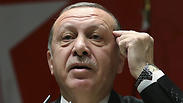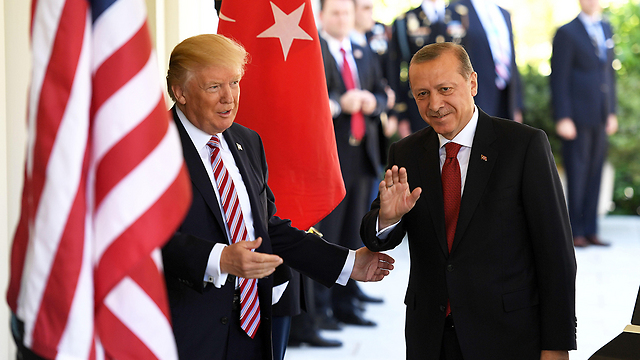
Turkish President Recep Tayyip Erdogan
Photo: AP

Turkey, Palestinians warn of diplomatic cuts over Jerusalem
Turkish President Erdogan, a senior aide to Palestinian President Abbas threaten dire diplomatic repercussions if US President Donald Trump goes ahead with a possible recognition of Jerusalem as Israel’s capital, including severing diplomatic ties with the Jewish state.
Turkey and the Palestinians warned on Tuesday of dire diplomatic repercussions if US President Donald Trump goes ahead with a possible recognition of the hotly contested city of Jerusalem as Israel’s capital.
Turkish President Recep Tayyip Erdogan told parliament that his country’s response “could go as far as us cutting diplomatic ties with Israel.”
A senior aide to Palestinian President Mahmoud Abbas warned that the Palestinian leadership could halt contacts with US counterparts in response to such recognition.
American officials have said Trump may recognize Jerusalem as Israel’s capital this week as a way to offset his likely decision to delay his campaign promise of moving the US Embassy there. Trump’s point-man on the Middle East, son-in-law Jared Kushner, later said the president hasn’t decided yet what steps to take regarding Jerusalem.
Still, the possibility of such recognition has triggered mounting criticism and opposition by Muslim and Arab states.
The Arab League with almost two dozen member states was to discuss the controversy later Tuesday.
On Monday, the Organization for Islamic Cooperation, which has 57 member states, said US recognition of Jerusalem as Israel’s capital would constitute “naked aggression.”
Erdogan said Tuesday that said such a step would lead Ankara to cut off diplomatic ties with Israel. He also said he would convene a summit meeting of OIC countries to oppose any move recognizing Jerusalem.
Majdi Khaldi, the diplomatic adviser of Abbas, said recognition of Jerusalem as Israel’s capital could destroy Washington’s role as mediator between Israelis and Palestinians.
“If the Americans recognize Jerusalem as the capital of Israel, then this would mean they decided, on their own, to distance themselves from efforts to make peace and that they will have no credibility or role in this issue,” Khaldi told The Associated Press in perhaps the most sharply worded comments yet by a senior Palestinian official.
“We will stop our contacts with them (in the event of recognition) because such a step goes against our existence and against the fate of our cause,” Khaldi said. “It targets Muslims and Christians alike.”
Israel captured east Jerusalem, home to major Muslim, Christian and Jewish holy sites, in the 1967 Six-Day War and quickly annexed it to its capital. The Palestinians seek east Jerusalem as the capital of a future state, and the international community says the city’s status must be determined in peace talks.
The fate of Jerusalem has been the perhaps most combustible issue in more than two decades of intermittent US-led Israeli-Palestinian talks on Palestinian statehood. While two of Israeli Prime Minister Benjamin Netanyahu’s predecessors were willing to consider a partition, the current Israeli government says the issue is off the table.
Israel regards all of Jerusalem as its capital, with most government functions, including the prime minister’s office, Supreme Court and parliament, located there.
Earlier this week, Abbas warned that American recognition of Jerusalem as Israel’s capital would jeopardize the White House’s nascent Mideast peace efforts.

















